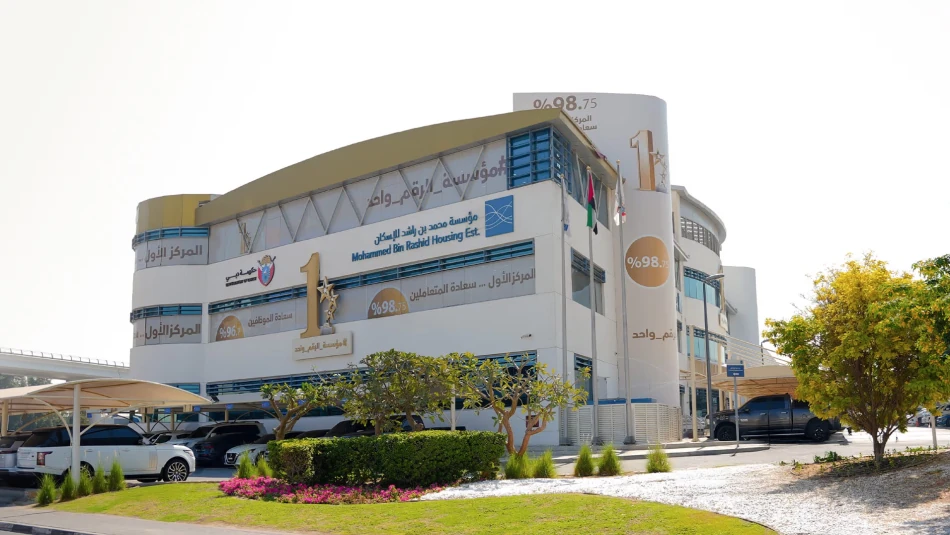
Emirati Housing Authority Offers AED 1.725 Billion in Residential Financing for 2025 First Half
Dubai Housing Authority Delivers $470M in Residential Support, Reinforcing UAE's Social Stability Strategy
Dubai's Mohammed bin Rashid Housing Establishment has distributed over 3,000 housing facilities worth 1.725 billion dirhams ($470 million) in the first half of 2025, marking a significant acceleration in the UAE's efforts to ensure citizen welfare amid rapid population growth and urban development. The initiative reflects Dubai's strategic pivot toward long-term social stability as it positions itself as a global hub for talent and investment.
Comprehensive Housing Package Targets Multiple Demographics
The housing support package demonstrates Dubai's sophisticated approach to citizen welfare, encompassing three distinct categories of assistance. The largest component includes 1,390 residential facilities valued at 1.184 billion dirhams, specifically designed to support citizens in construction, maintenance, and home purchases. This represents a direct investment in homeownership, a cornerstone of social stability in rapidly developing economies.
Additionally, 935 housing grants worth 540.3 million dirhams cover maintenance, construction, and property ownership, while 695 residential land grants complete the integrated support system. This multi-tiered approach suggests Dubai's recognition that housing needs vary significantly across income levels and life stages.
Strategic Alignment with Dubai's 2040 Vision
The housing initiative directly supports Dubai Urban Plan 2040 and the D33 Social Agenda, both ambitious frameworks aimed at establishing Dubai as a leading global city for quality of life. Mohammed Hassan Al Shehi, Acting Executive Director of the Mohammed bin Rashid Housing Establishment, emphasized the program's role in creating a "flexible and comprehensive housing system based on efficiency and service quality."
This alignment is particularly significant given Dubai's competition with other global cities like Singapore and Hong Kong, where housing affordability has become a critical factor in attracting and retaining talent. By proactively addressing citizen housing needs, Dubai appears to be learning from the challenges faced by other major urban centers.
Economic Implications and Regional Context
The substantial financial commitment reflects Dubai's strong fiscal position and confidence in continued economic growth. At nearly $500 million in six months, this pace of housing investment suggests annual commitments approaching $1 billion, representing a significant portion of government expenditure dedicated to social infrastructure.
This approach contrasts sharply with housing policies in other Gulf states, where oil revenues have traditionally funded direct housing provision rather than facilitated private ownership. Dubai's model, emphasizing citizen empowerment through ownership support, aligns more closely with developed market approaches while maintaining the social safety net expectations of Gulf societies.
Long-term Social and Economic Benefits
The housing program serves multiple strategic objectives beyond immediate citizen welfare. By promoting homeownership, Dubai creates deeper community ties and reduces population mobility, essential factors for maintaining social cohesion in a rapidly diversifying society. The initiative also stimulates the construction sector, supporting economic diversification goals while creating employment opportunities for both citizens and residents.
Furthermore, the program's emphasis on maintenance and renovation suggests recognition of Dubai's aging infrastructure in established neighborhoods, addressing potential urban decay before it becomes problematic. This proactive approach to urban management positions Dubai favorably compared to cities that have struggled with infrastructure maintenance as they mature.
The success of this housing initiative will likely influence similar programs across the Gulf region, as other emirates and neighboring countries observe Dubai's model for balancing rapid development with citizen welfare. The substantial financial commitment demonstrates confidence in Dubai's continued growth trajectory and its ability to maintain social stability while pursuing ambitious economic goals.
Most Viewed News

 Sara Khaled
Sara Khaled






